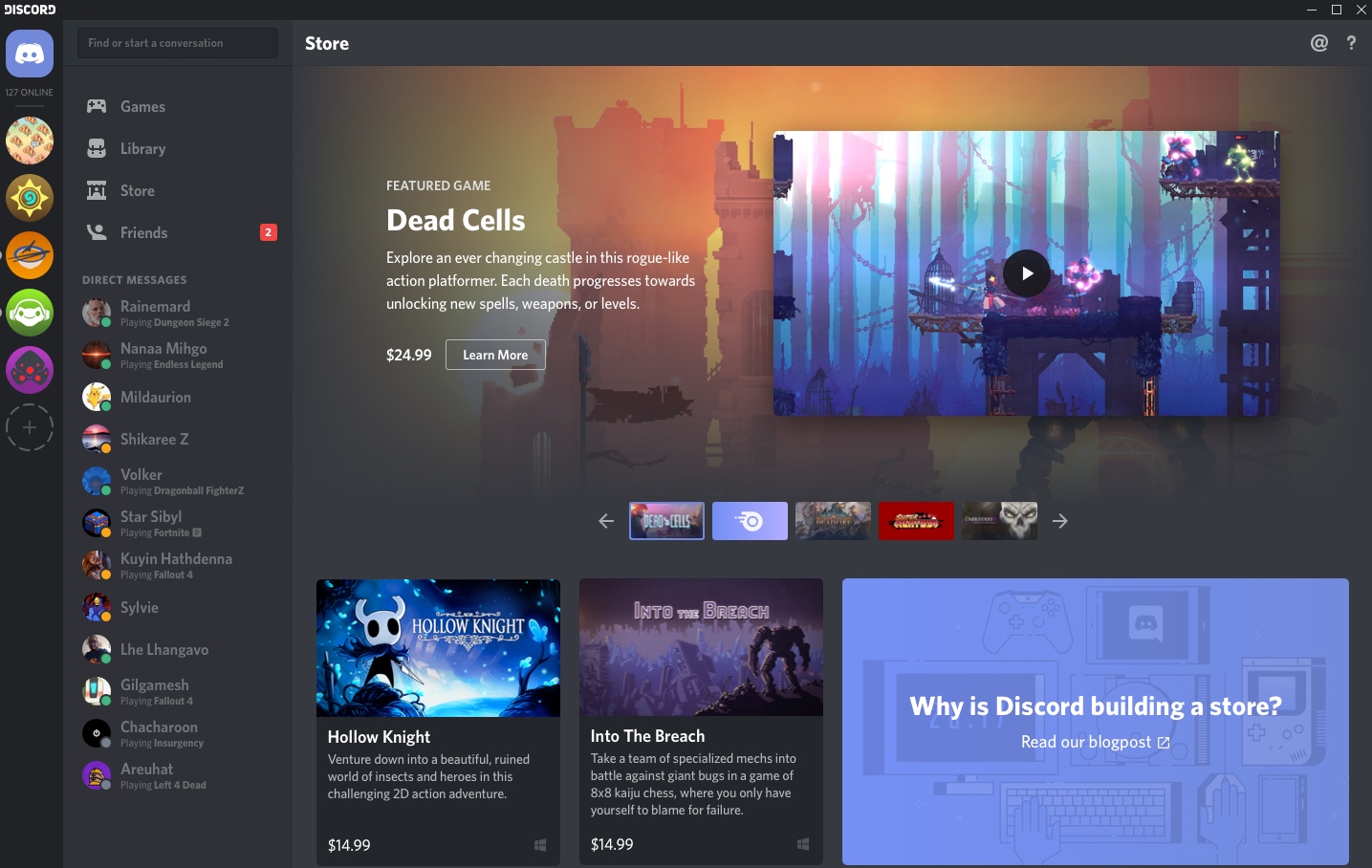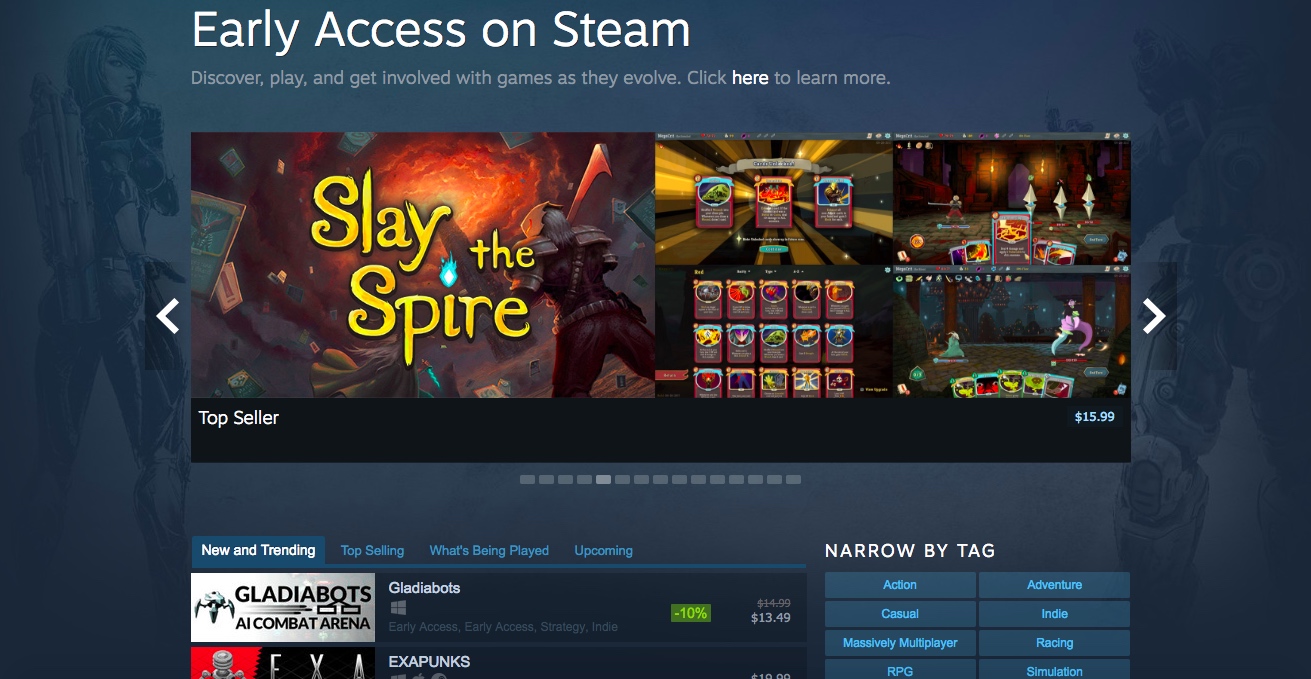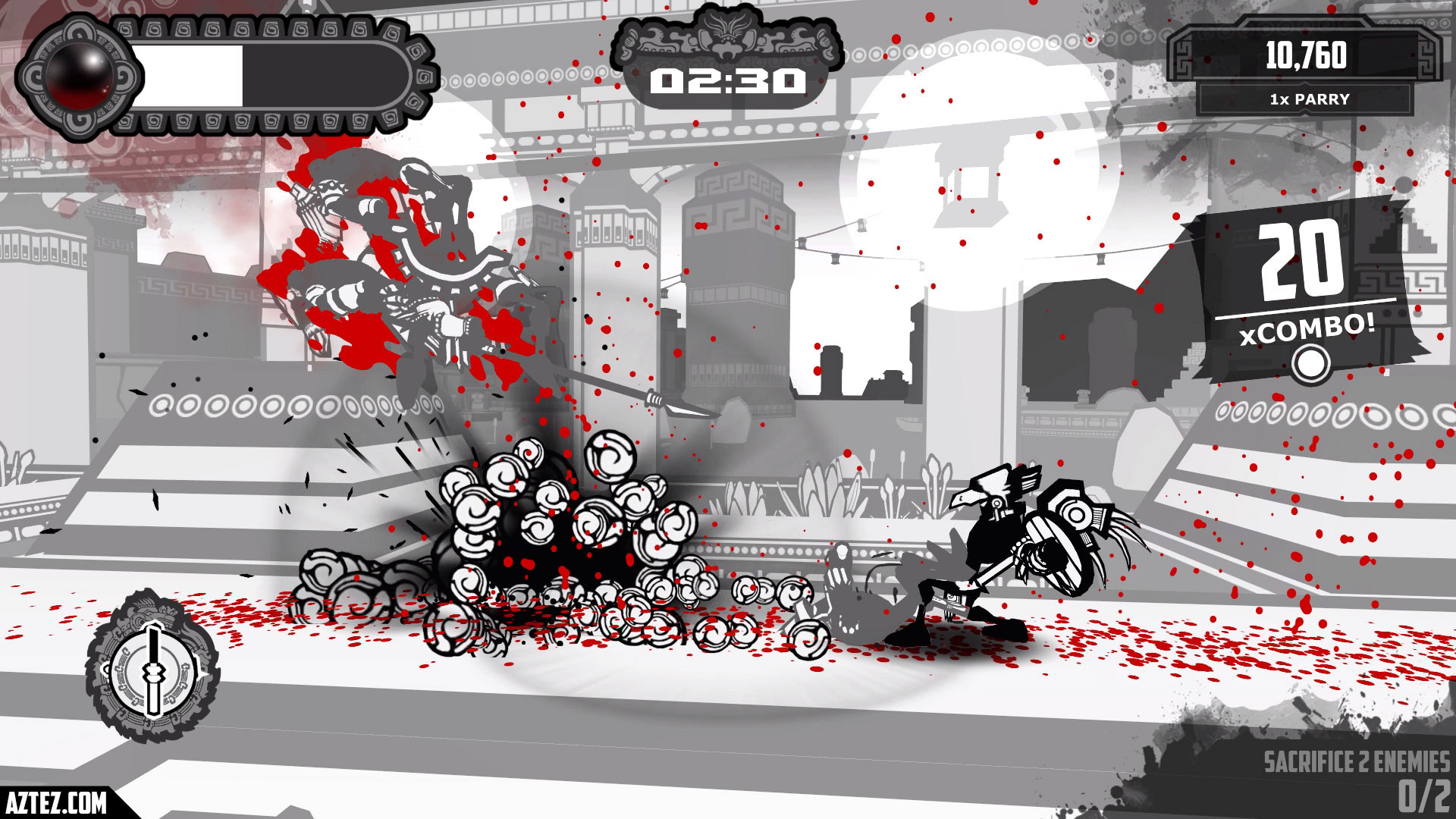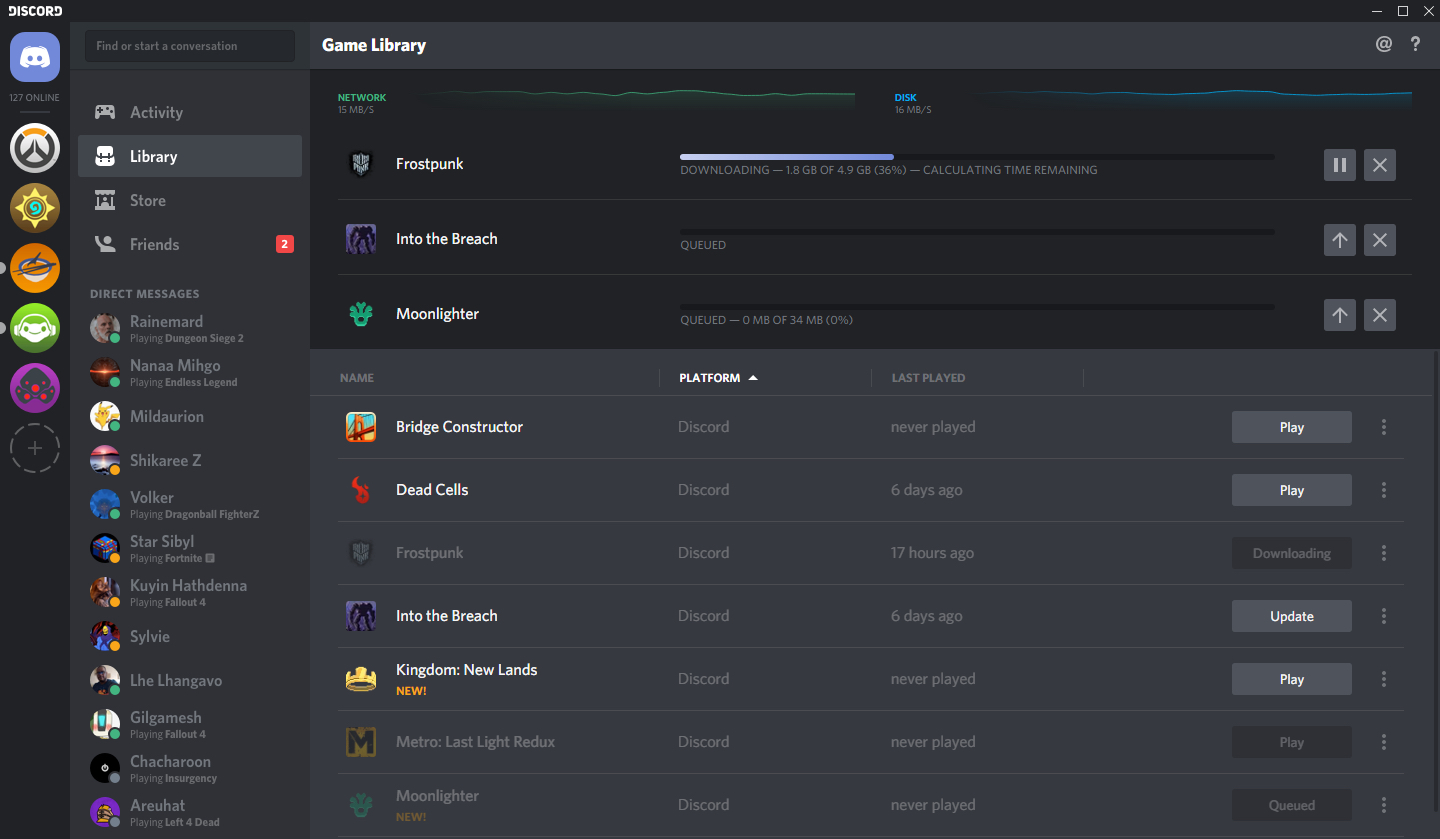 The Discord homepage doesn't mince words. "It's time to ditch Skype and TeamSpeak," it says in large white letters, just above buttons to download or open Discord, a video game-centric chat service that's exploded in popularity since launching in 2015. Today, Discord has 150 million users, and it's about to take on another major company in the gaming space: Steam. Discord today revealed plans to start selling games, rather than simply enabling players to talk over the titles they've purchased through Steam, Origin, Humble, GOG and other distribution platforms. The store is live in a limited beta in Canada, featuring a handful of high-profile indie games to get the ball rolling, including Hollow Knight, Dead Cells, Frostpunk, Banner Saga 3 and Super Meat Boy. Plus, Discord promises to help finance and publish some games, which will be released "First on Discord," exclusive to the platform for about 90 days. 
The store will expand as testing continues and more developers become aware of this vast new marketplace. It could expand a lot -- Steam, for example, hosts nearly 19,000 titles, with more going live every day. Steam is expected to add 10,000 games to its library in 2018 alone. Here's where Discord's marketplace could have the upper hand. The company emphasizes its store will be curated, featuring games hand-picked by staff and chosen through community feedback. "We'll be launching a curated game store experience similar to one of those cozy neighborhood book shops with recommendations about the hottest and newest games from us to you," Discord writes on Medium. The goal here is to reduce clutter and provide a haven for high-quality games, rather than a dumping ground for every pixelated project that comes its way. Oversaturation is a significant problem for players and developers, and it's one that Steam has been struggling to properly handle for years. 
Steam entered the game-distribution business in 2002. George W. Bush was in his second year as president of the United States and Nickleback's "How You Remind Me" was on track to be the top song of the year. Gaming's sixth generation had recently begun, and the PlayStation 2 and Xbox had just hit the market. Buying games online was a novel concept, but Valve Corporation needed a way to reliably roll out patches for its connected games, most notably Counter-Strike. So, it built Steam. The platform caught on (it was required for anyone who wanted to play the latest version of Counter-Strike) and over the years, developers and publishers flocked to Steam. It became the central hub for all PC games, a one-stop shop for every new major release, and eventually, a lucrative home for high-profile independent games. Valve had a staff of folks who decided which games made the cut, meaning developers had to pitch their projects and cross their fingers. This was particularly important for indies, who generally worked on shoestring budgets with little marketing power. "It used to be that an indie game of reasonable quality, released on Steam, would probably at least break even. That is no longer true."
- Jonathan Blow According to Statista, just seven games made their way to Steam in 2004, and only six in 2005. By 2012, that figure had jumped to 379. And then everything changed: Overwhelmed by the gaming community's growing reliance on the internet and a massive influx of independent games, Valve decided to ditch its curation process. It opened the floodgates with Steam Greenlight, essentially allowing any developer to post a game on a separate store, where the community could vote for it to land on the main Steam marketplace. In 2014, 1,771 games landed on Steam proper, according to Statista. The following year, that rose to nearly 3,000 titles. And in 2017, 7,672 games were published on Steam. 
"It used to be that an indie game of reasonable quality, released on Steam, would probably at least break even. That is no longer true," Braid and The Witness creator Jonathan Blow told Engadget in 2016. Valve has experimented with a few different approaches to curation and saturation since 2012. Greenlight is dead, but its Early Access program is alive and well, allowing developers to publish unfinished games and grow their communities before migrating to the main Steam page. In June, Valve announced it would stop curating games in any way, allowing everything that's not illegal or "straight-up trolling" to have a spot on Steam. For players, this means it's normal to have a backlog of unplayed games collecting dust in their Steam libraries. A 2014 study by Ars Technia revealed 37 percent of all games purchased on Steam were never booted up, not even once, and that was before the store's publishing numbers truly skyrocketed. For developers, this means competition has never been more fierce. Take Aztez for example -- indie developers Ben Ruiz and Matthew Wegner started working on the game in 2010 and it generated a ton of early buzz. These were the days before Greenlight or Early Access, and the duo's initial launch plans revolved around Steam, where they'd already made contact with in-house curators. 
It took seven years to finish Aztez. By the time it came out on August 1st, 2017, Steam was a changed landscape. Forty other games landed on the store on August 1st alone. Aztez got lost in the crowd. "If I was paying attention to Steam, maybe I wouldn't be so blindsided by what happened, but I'm also not necessarily sure what I would've done differently," Ruiz told Engadget last year. "If I'd have known like, oh, it's a saturated market now -- what the fuck do you do?" You curate. That's the angle Discord is taking, at least for now. Discord is positioning its new store as a home for hand-picked games, trying to bring the industry back to pre-Greenlight levels of new releases. "There's an abundance of fantastic games," Discord wrote on Medium. "Fantastic games that we missed. Games that we even purchased but never got around to playing. We want to give you an easy opportunity to play the golden games you've missed and we want to offer an awesome selection. So, we've curated some of these golden games and will be adding them to Discord Nitro." "We'll rely on our community and our team to make the store feel super personal."
- Discord Nitro is Discord's paid subscription service that nets users upgraded features and special goodies, including a boosted upload limit, custom emojis and higher-quality screen share. It costs $5 a month or $50 a year. And now, it'll include access to Discord's curated game store. Plus, players will be able to launch any game on their computer directly through Discord, even if it's originally hosted through Steam. "As the store grows, we'll rely on our community and our team to make the store feel super personal and focused on games that we genuinely think you'll enjoy," Discord said. 
Discord is entering the game-distribution market with a lot of advantages, including a user base of 150 million people and the ability to publish, and exclusively host, new games. It's most critical advantage, however, is hindsight. Valve had to react to a rapidly shifting environment, where suddenly thousands of developers had games ready to hit online stores, and it bumbled its way through the indie industry's growth spurt. Today, Steam is a repository for all games, making it difficult to be a champion for any particular title. Discord has the ability to provide a truly curated, streamlined store for high-quality games, but it's going to be a huge and difficult project. Discord employees are surely being hounded with inquiries from interested developers this very moment, and interest is unlikely to let up as time goes on, if the platform is successful. This is the very same situation that propelled Valve to stop supporting in-house curation altogether. Now it's Discord's turn to try and make it work.
via Engadget RSS Feed https://ift.tt/2M7xeOJ |
Comments
Post a Comment